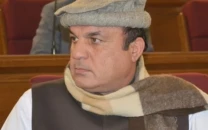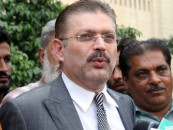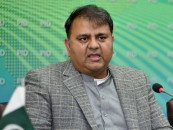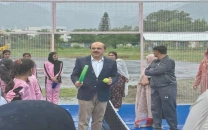Fighting terror: Draft policy aims to dismantle terror networks
Proposes judicial, police and education reforms, review of foreign policy.

The draft policy focuses on eliminating all terrorist networks through counter-insurgency, intelligence, police and prosecution. PHOTO: FILE
Pakistan’s new counter-terrorism policy seeks to dismantle all terrorist outfits and their networks through wide-ranging reforms in the education system, police, judiciary and foreign policy.
The proposed policy – titled National Counter Terrorism and Extremism Policy 2013 – seeks a re-assessment of governance weaknesses and policy deficiencies that have permitted the exploitation of vulnerable groups by terror outfits.
Prepared by the interior ministry, the policy could be unveiled during a National Assembly session starting today (Tuesday), where Interior Minister Chaudhry Nisar Ali Khan will delineate its salient features. The policy will be sent to the Defence Committee of the Cabinet for appraisal before it’s adopted for implementation by the end of this month.
According to a draft available with The Express Tribune, the five-layered counter-terror policy seeks to dismantle, contain, prevent, educate and re-integrate.

Dismantle
The draft policy focuses on eliminating all terrorist networks through counter-insurgency, intelligence, police and prosecution.
It rules out reconciliation with the leadership of terrorist groups but gives ample room for patch-up with ‘foot soldiers’ – provided they respect the state authority.
Calling for a new counter-insurgency framework, the policy integrates military action with civilian follow-up. For this purpose, it calls for (a) building the police capacity (b) following up on the military action in an extremist bastion with a broad strategy focused on development work and economic revival.
“For a sustainable effort it is critical that the police become the first line of defence by undertaking the role of local intelligence,” says the policy.
In what appears to be an overhaul of policing, the policy seeks to adopt the “police station (thana) as the basic unit. It gives a proactive role to police stations to obtain intelligence at the grass root level. This means that once implemented, the policy will pave the way for training the police in modern techniques of investigation, evidence collection, interrogation, prosecution and rapid response.
The proposed policy also calls for developing an institutionalised mechanism for information-sharing across the provinces and intelligence agencies. It also envisages revision of the entire legal framework for the crime of terrorism to improve prosecution.
Contain
This component has three main parts; security against attacks, emergency response and victim management. The first calls for development of a strategy to secure assets, buildings and other potential targets from attacks.
In emergency response, each district will develop a command and coordination structure to ensure that in case of a terrorist attack rescue operations are undertaken efficiently.
To ensure effective victims management, the state will develop an institutionalised mechanism to respond to the long-term needs of victims and their families.
Prevent
The proposed policy calls for periodic assessment of the terror threat by the National Counter-Terrorism Authority in coordination with intelligence agencies.
It also focuses on plugging terrorist financing through creation of counter-terrorist financing units at the provincial level and ensuring implementation of the anti-money laundering laws.
The policy proposes review of the current border management capacity, especially on western borders, to restrict movement of terrorists to and from Pakistan. It proposes enhancing the capacity of border forces since deployment of army is not a permanent solution.
Educate
The draft policy proposes an urgent study of the country’s education sector to evaluate its role in the development of an extremist mindset and focus on reversing this trend.
Interestingly, the madrassa system has not been singled out for reforms, rather the entire system, including curriculum, textbooks and teachers of all schools, will be reviewed.
The policy says cleavages in society provide a facilitating environment for terrorist to create sympathisers and recruits, which is why district-level extracurricular activities will be promoted under the policy to allow dialogue between children of all strata.
Furthermore, it proposes a counter-propaganda policy that will highlight atrocities committed by terrorists through the media.
Re-integration
The draft policy concedes that even if extremist organisations are dismantled, their activists and sympathisers would still retain the ability to regroup.
“A weaning away process will need to be designed for members with a potential to reform and re-integrate into society,” according to the policy. Former jihadis will be asked to identify reconcilable militants for reintegration.
Foreign policy
Keeping in view the difficulties faced in diplomatic relations, the draft policy suggests that the situation warrants a serious revisit for Pakistan’s existing foreign policy so as to facilitate the process of weaning out terrorism from the country.
Published in The Express Tribune, August 13th, 2013.



















COMMENTS
Comments are moderated and generally will be posted if they are on-topic and not abusive.
For more information, please see our Comments FAQ